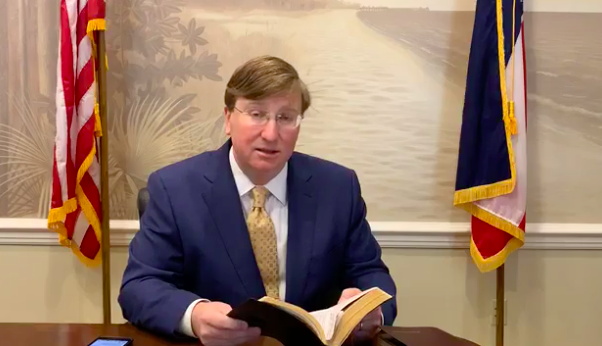
The Mississippi governor needs to quit engaging in unconstitutional and pointless religious attempts to tackle the coronavirus, says the Freedom From Religion Foundation, a national state/church watchdog.
Several concerned Mississippi residents have contacted FFRF to report that Gov. Tate Reeves, in his official capacity, posted a highly religious message on his Facebook page that contained eight separate prayer requests to Mississippians as a supposed way of dealing with the coronavirus. The next day, Reeves recorded a Facebook Live video asking Mississippians to pray to cope with the pandemic — and then led them in prayer. The Facebook Live video featured Reeves in front of the American and the Mississippian flags offering two prayers and conducting three readings from the bible. As the video concluded, he exhorted his constituents to “please continue to pray.”
These actions amount to an endorsement of religion (in this case Christianity) in contravention of the Establishment Clause of the First Amendment, FFRF reminds the governor.
“The First Amendment wisely prohibits government sponsorship of religious messages,” FFRF Co-Presidents Dan Barker and Annie Laurie Gaylor write to Reeves. “The Supreme Court has said time and again that the ‘First Amendment mandates government neutrality between religion and religion, and between religion and nonreligion.’ ”
Reeves needs to remain cognizant that as the governor of Mississippi, he has taken an oath to uphold and defend the U.S. Constitution — an entirely godless and secular document — and is charged with great responsibility over citizens, including those citizens who may not share his personal religious viewpoints. In a time of a grave crisis such as the coronavirus scourge, he needs to stop wasting his time engaging in sectarian prayer and focus his energy on ensuring the well-being of all Mississippians.
As governor, Reeves represents a diverse population that has a significant proportion of atheists and agnostics who do not believe in a deity, much less the power of prayer, FFRF points out. Nonreligious Americans make up the fastest-growing segment of the U.S. population by religious identification: Over one-third of Americans are non-Christians, including the more than one in four Americans who currently identify as religiously unaffiliated. Broadcasting a live Christian prayer reading signals to this sizable minority “that they are outsiders, not full members of the political community, and an accompanying message to adherents that they are insiders, favored members of the political community,” to quote the U.S. Supreme Court. Furthermore, Reeves’ request to “please pray for a spirit of unity in this country” is particularly ironic, given that prayer remains one of the most divisive topics in our nation.
A message to encourage safety and show governmental concern in a time of hardship could have been effectively conveyed without prayer and the unnecessary entanglement of government and religion, FFRF emphasizes. Reeves needs to instead concentrate on taking real, effective steps to slow the coronavirus pandemic in his state, especially since his tardiness on this front has been widely criticized.
“Medical science and rational precautions are needed during this pandemic. It’s essential for pious politicians to get off their knees and get to work,” adds Gaylor. “Every moment wasted by public officials in directing citizens to engage in wishful thinking is time that should have been spent preparing their state or local governments to marshall help to medical professionals and give real guidance to citizens.”
The Freedom From Religion Foundation is a national nonprofit organization with more than 31,000 members across the country, including in Mississippi. Its purposes are to protect the constitutional principle of separation between state and church and to educate the public on matters relating to nontheism.